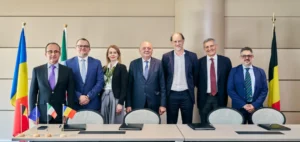French start-up Neext Engineering has announced its partnership with major energy players such as Westinghouse, General Electric and the Centre National de la Recherche Scientifique (CNRS) to create a modular nuclear power plant. The goal is to decarbonize the industry by developing small modular reactors (SMRs), which currently equip French aircraft carriers and nuclear submarines.
Renowned partners for an innovative solution
Neext Engineering has signed agreements with Westinghouse, General Electric and the CNRS to design an integrated energy solution for energy-intensive industries such as cement and steel mills to decarbonize their industrial processes. The plant will produce electricity and heat, allowing for other industrial solutions, such as the production of hydrogen, ammonia or synthetic fuels. Neext Engineering’s partners, who are legitimate players in the nuclear industry, are working on an innovative Generation IV energy project, called Sparta, which aims to revolutionize nuclear power plant construction.
Innovative digital tools to streamline plant construction
Neext Engineering focuses on using innovative digital tools to configure the plant on demand, streamline prefabrication, optimize delivery and operate the system. Neext Engineering plans to submit a file to France 2030 at the end of March, as part of the “innovative nuclear reactor” call for projects. This project was announced by French President Emmanuel Macron during his speech in Belfort on February 10, 2022, with the aim of reviving the nuclear industry. If the project is successful, the company will recruit 25 people. The operational demonstrator should be ready by 2030.
A project that arouses interest
Neext Engineering’s project is already attracting curiosity. Jean Maillard, a representative of the company, said that discussions were underway with the management of ports, airports and even with an African country. This information suggests that the project has already attracted the attention of potential partners and that its success is already envisaged.





















